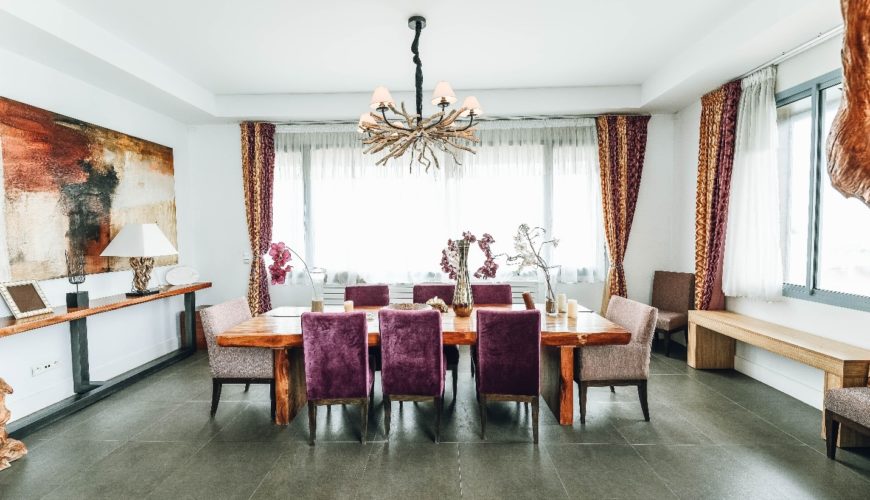An area reserved for dining and entertaining is a wonderful luxury to have in your home – follow our expert tips and tricks to ensure that you are making the most out of your dining room:
First and foremost, you need to determine the type of dining space that you want. Once you’ve decided on whether the room will be for guests, day-to-day use or for a little more than just dining, you can start to plan your layout!
The Formal Dining Room
A formal dining room is for the home that’s entertaining regularly. A more traditional dining room is associated with formal dining so a classic layout is the way to go.
The Table: The dining table will be the room’s centerpiece and should comfortably accommodate 8-12 chairs. Choose a dark, natural material for a striking and classically beautiful piece. Opt for the standard rectangle shape for optimum space usage and style. You could even go for a glass dining table set to make it easier. We all have our preferences, so I guess it depends on your taste and the overall aesthetic.

Dining Chairs: A classic dining chair with arms will fit the mood properly. Go for an upholstered style in an understated and elegant neutral. By picking a timeless shade your dining room’s look will last for many years to come. Be sure to match your chairs to the table either in color, material or style to prevent the room from looking too relaxed.
Sideboard: Incorporate a sideboard into your dining room layout to enhance the practicality of your space. This is a classic piece and will sit neatly against the wall so it won’t disturb the room as a whole. The sideboard’s biggest plus is its storage potential – stash away your crockery, cutlery and other dining accessories for ease of use and organization.
Bookshelves: Adding one or two bookshelves to the room will bring an inviting feel to your formal dining experience. If you have the extra space position these against the walls that are facing the doorway, this will look warm and grand.
Lighting and Accessories: Split your lighting around the room for extra ambience. By adding smaller lamps you can ditch the overhead light for a warmer and more inviting atmosphere. Looking to take it one step further? Why not place a few candles around the room for an old world, inviting feel.
The Informal Dining Room
An informal dining room is a space that you and your family will be using for everyday meals, but also for homework, studying and relaxing.
The Table: Opt for a round dining table for an inclusive, casual vibe. This fits the tone of the space perfectly and will make it easier for you to address everyone around the table. Pick a light and airy material for extra style points.

Dining Chairs: A round table should be paired with armless dining chairs. This will avoid any clashes and overcrowding. As with a formal dining room, as long as there is a coherent style, colour or material quality the table and chairs will match nicely.
Sofa: For extra warmth add a sofa to your layout, have this facing your table with no coffee table obstructing the open space. This will define your room as informal whilst also providing some extra seating opportunities.
Lighting and Accessories: Be sure to introduce lots of personality to your informal dining space. Add artworks, mirrors and photo frames to reflect you and your family. Putting a stylish stamp on the room reinforces its casual nature whilst also bringing some pleasing visual impact.
The Multifunctional Space
This option is perfect for a family home that is limited on space. Your dining room can coincide with so many different functions however, a lounge or living room is the perfect way to go.
The Table: Your dining table should be warm and homely, chances are you going to be using it from day-to-day for all of your meals so make sure it’s accommodating to some wear and tear. Choose a reclaimed timber for your material, a worn look is part of its character and therefore it will only look better over time!

Dining Chairs: Feel comfortable in incorporating less seating than you naturally would in a room that’s used exclusively for dining. As long as you have enough places for your family plus a few extra for the occasional guest, you won’t be missing out.
Sofas: Placing a single sofa or a living room set into the non-dining half of your room will be relaxed, inviting and useful. For when you do have guests over, having drinks or coffees after dinner will be a breeze, and for day-to-day these will keep a sociable feel to your meal times.
Add Ons: To maximize the comfort factor of your room add a coffee table and a television. This will provide you with some excellent storage and will make this half of the room feel truly homely for you and the family.
Accessories: Take advantage of the impact that rugs can have on a space! By adding two different rugs you will be establishing which area of the room is for dining and which is reserved for relaxation. Be sure that the piece you select for the dining portion of the room is darker in colour and in a tight weave, this will avoid any long term markings or stains.
Now that you’ve covered the differences and essentials of the three different types of dining experiences in kitchen remodeling, you can start your journey towards the perfect dining space! Be sure, to begin with the room’s centerpiece – the dining table. With an extensive array of options and styles you’ll be sure to find the right furniture for you dream dining room layout.




